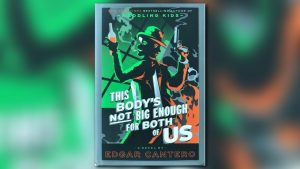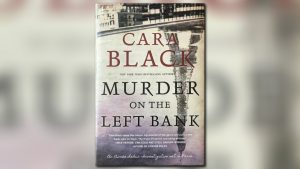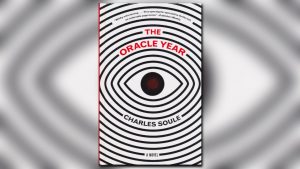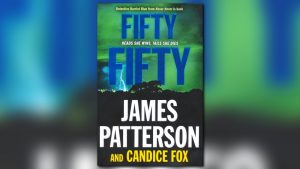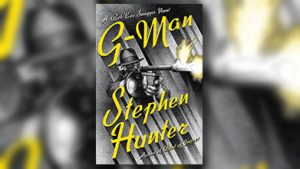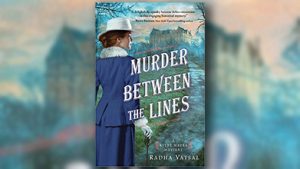“It Worked For Me: In Life and Leadership,” a memoir by former Secretary of State Colin Powell, provides insight into how the retired four-star general achieved his goals, transforming dreams into realities. He writes with courage and power that encourages others to create a successful career. Powell describes the book as a blueprint for leadership.
NARRATOR: "Books & Co." is made possible by the Virginia G. Piper Center for creative writing. Serving writers and readers in the Phoenix metropolitan area, the state of Arizona, and the world.
ALBERTO RIOS: Welcome to "Books & Co." Bienvenidos todos. I'm your host, Alberto Rios, and we're joined today by former secretary of state chairman of the Joint Chiefs of Staff, and four-star general, Colin Powell. Who will be talking about his book, "It Worked For Me: In Life and Leadership." Written in collaboration with Tony Colt and published by Harper. This is quite an opportunity to ask you so many questions. And after having read your book, I feel like I've drunk a really strong cup of coffee. But it lasts longer. Before we go there, and -- My first impulse is to ask you, how do you relax? I read that book, full of energy. How do you relax?
COLIN POWELL: I relax by staying home a lot. I have a home office, and I can do almost everything I need to do from home. I have two regular offices, but I deal electronically with them. And so I work out in the morning, I peddle, I do my exercises, and I read a lot. But I travel for business, I travel a lot. But for relaxation, I just like to stay home. I've seen many, many things in the course of my career in the military and diplomacy, but nothing beats home. And that's where I wrote the book, sitting at home.
ALBERTO RIOS: Fair enough. It sounds like for you, relaxation is somewhat work as well. To somebody else. But I think that's something that comes through in the book.
COLIN POWELL: Yeah.
ALBERTO RIOS: When you're sitting at home, you must watch TV occasionally, and probably tune in to the news, and you sometimes must see yourself.
COLIN POWELL: It's always a surprise, but yes.
ALBERTO RIOS: And you know, people are reporting whatever they're reporting. And you know whatever you know. How do those two things jive?
COLIN POWELL: Most often there is confluence between the two things. Maybe they don't get it 100% right, but it's close enough to keep the American public informed. And I do watch an enormous amount of television, because it's my companion over my shoulder. Eye even have a rear view mirror by my computer so I can watch television through the rear view mirror. And so I have a television on a lot. It allows me to keep track of the world. And I watch a lot of public broadcasting, but I watch a lot of foreign television as well, especially foreign news channels, because that's a fascinating way to keep up with what's going on in the world. So I enjoy television. There's always a television on behind me.
ALBERTO RIOS: Only one?
COLIN POWELL: Only one.
ALBERTO RIOS: You don't have one of those big --
COLIN POWELL: no, no. That would be too much. Your brain can only focus on one thing at a time. But I have three, four computers going at the same time. But one television channel behind me. I may or may not be listening to it, depends how concentrated I am on what I'm doing.
ALBERTO RIOS: Okay. I like that. It sounds like it's humming all the time regardless.
COLIN POWELL: It is. It starts about 6 o'clock in the morning and goes till about 10 or 11 at night.
ALBERTO RIOS: You have time for family, and --
COLIN POWELL: Yeah. Our children are all grown and gone, and grandchildren are nearby, but they're not living with us. And we have a lovely home in Virginia, and it's three levels, the middle level is where we have the kitchen and my wife and I meet, the lower level used to be a family room, but I realized they're all gone, so I converted it into a home office. That's my part of the house. And the third floor is where the bedrooms are, and my wife has two of those rooms she uses for her office. So we have got a wonderful arrangement in our home.
ALBERTO RIOS: It sounds nice. Your book, I don't know if you would care to characterize it, but it's full of all sorts of things from your life and aimed at the lives of others I would say. It's gifts. These are gifts. Gifts that were given to you and that you are I think sharing. Is that fair to say.
COLIN POWELL: That's fair to say. People say, why didn't you write a reck political memoir? Then I had lunch with so-and-so. Then this happened, then that happened. Well, I didn't feel like writing that kind of book. Because most of my time is spent on the speaking circuit, I kind of know what audiences are interested in. And I kind of know how the audience reacts to my speech. And that gave me more insight into what they might be interested in. So I sat down and started to write these stories, all of them are true. All of them are from my life. That's why the title, "It Worked For Me." It's not a rhetorical question. It's a declarative statement, it worked for me. I don't know if it will work for you, I care, but not that much. It worked for me. It was my agent who insisted the southbound title somebody, "in life and leadership." Not "in leadership and life." And his point is, it's more about living your life than it is in a leadership position. And so I started jotting down these stories, some of them come from my first book many of them are new, and I expanded a lot of things I'd never expanded on before in my first book or otherwise. Over a period of about a year, about 28 of these came down out of my memory on to paper. All on the computer. And I was in no hurry, some weeks would I do a couple, I might go three months before I touched it again. When I had about 28 of them, I thought let me throw it together. And we threw the 28 chapters together, had somebody put it together for me, and I shared it with a few trusted agents and friends. And they said it's interesting, you ought to do some more and finish it, and focus it a little more. And so after doing some more, I got Tony Colts, my collaborator to join me. He helped with putting it together, make sure it makes sense, what makes sense to Powell might not make sense to someone else. Between the two of us we came down at 44 chapters. No index, and no chapter is connected to any other chapter. They all stand alone. And that was very deliberate. Because -- Somebody said these are parables. As many of them are, they're parables.
ALBERTO RIOS: That's a great word.
COLIN POWELL: Some in the back are more serious and substantive. But for the most part, the early part of the book, are parables. I talk about things that happen in church, things that happen in school, things in my family life, I try to describe to people through these stories what kind of a person I am. And what kind of family I had, and how that shaped me in my growing up experience. And so I'm very pleased with the book and I'm pleased with the reaction its got. People say no index? How can you have a Washington book without an index? I said because you can't look yourself up. You've got to read something.
ALBERTO RIOS: You have an exciting thing happening, the Colin L. Powell Center for Leadership and service is becoming the Colin L. Powell School.
COLIN POWELL: For civic and global leadership. When I left the state department I went back up to my alma mater city college of New York, because I knew there was a center that had been named after me. But I really hadn't had anything to do with it because – I went up there, I sat around a conference room table with about 20 young students, they were from all over the world. They were immigrants, they were black, white, green, blue, yellow, you name it. And each told me their story as they went around. I came here, my parents came here. And I was so deeply moved by these stories, because when they came -- When I came back around to me I said, you kids are just like I was 50 years ago. And that's when I said, I've got to get more deeply involved in this. So I did. And the center focused on leadership and on service learning. Meaning, the students do things in the community that relate to what they're studying. And it grew, and expanded, and it started to connect with other departments in the school. So the president of the school said, we need to expand this. Let's make it an entire school with five academic departments and about a third of the student body. And my professors are rolling over in their graves. But we're going to do that on the 2nd of May. We're going to have a convocation that creates the school, very proud of that.
ALBERTO RIOS: I find that exceptional. I'm glad to hear that story is in the world. There ought to be more.
COLIN POWELL: There ought to be more. A major feature of my life is working with my wife to get into the lives of young kids who think they're disadvantaged. And you could say they are disadvantaged, but what I say to them, you have a mind, healthy body, you've got America. And you got your own determination. So don't walk around thinking there's something wrong with you, you're disadvantaged. Let other people think that, but never yourself. And you have to pump them up. I play a game when I'm talking to kids at school. After I've given them a homily, I ask them to come up and ask questions if they want. Hands raise, I make them come to the front of the class, I tell them stand at attention. I teach them what that means. And I have them standing up straight, get the hat off your head, pull your pants up, look straight ahead, feet 45 degrees, raise your chin, and look straight ahead and speak out loudly to your fellow classmates with the questions. General Powell – You would be surprised how this changes kids. When you put expectations on them. When you tell them, stand up. Speak out loud. Make sure people can hear you. No hats on backwards. None of that nonsense.
ALBERTO RIOS: It's a wonderful moment to hear it that way. A few years ago I was invited to speak at West Point, I was invited to one of the cadet quarters. They showed me they had about eight articles of clothing, eight inches apart, and they said that out of those eight or however many there were, they could make six million combinations. I think you're saying something sort of similar to that. That little aggregate that we are, that little conglomeration of us.
COLIN POWELL: There's something in there waiting to get out. Very briefly, one of the programs we have at the museum of modern art in New York, working with them we wanted them to bring more students from all over the city, high school students, they brought a group of high school students in there and they showed them the modern art, the beautiful statues and the paintings, and when it was over, we asked one of the young boys, what impressed you most about the museum? His answer was, the guards. He could aspire to be one of the guards. They're wearing a uniform, they were sharp, they were doing their job. A kid from the south Bronx or Harlem can aspire to that, and maybe then go higher. Aspire to something else. So you have to measure the level of aspiration that kids can achieve so you don't push them ahead of themselves. But you keep the standard going higher.
ALBERTO RIOS: I'd like to take a moment to remind our viewers that you're watching "Books & Co." I'm your host, Alberto Rios, and we're joined today by general Colin Powell, talking about his book, "It Worked For Me: In Life and Leadership." Were you maybe the necessary general at the time you came along and with your background and the things had you to offer?
COLIN POWELL: There are many generals. I wouldn't presume to be the necessary general.
ALBERTO RIOS: You even say that in your book. I am asking you something, you came from a very particular background, you were unlike I would say the majority of other generals, and I think you brought something as a result.
COLIN POWELL: I get asked about this all the time. Well, did you go to West Point, did you go to Texas A&M, I said, no, I went to public school in New York City college. And you have to remember, I came along during the days of segregation. Segregation had just ended when I came into the army. And the army was the most progressive institution in the country at that time. Even though the communities around, our bases were still segregated. When I got to Fort Benning my first assignment to be trained, the message was clear -- We don't want to hear about your background and the fact you're a poor kid from Harlem and the Bronx. And your parents are immigrants and you were poor, and you went to a poor public school. That's no interest to us. The other thing we want to know is can you perform. If you don't perform you don't have a career in the army. That's all I ask for. People often said, when you were a kid growing up in the south Bronx, did you ever dream you'd become chairman of the Joint Chiefs of Staff? I smile and say, yeah, I was. I was standing on the corner of 163rd and Kelly, I was about 10. And I said, boy, you're going to grow up to become chairman of the Joint Chiefs of Staff. Life doesn't unfold that way. I didn't know where I was going. It was in college that I discovered ROTC and the military. And I fell in love with it, and it became my career. People say, well, suppose you hadn't made general, chairman of the Joint Chiefs of Staff? That would not -- That's not a measure of my success as a soldier. I just wanted to be a good soldier. So my success I measured every single day, not by what rank I achieved or whether I became chairman or not. A lot of guys who qualified to be chairman. But if they had told me leave, you had enough, go home, would I have gone home happy, because I would have done my best for as long as they want me around to do my best. There's another story in the book called when to get off the train.
ALBERTO RIOS: Right.
COLIN POWELL: And I know a lot of people who don't know when to leave. And I got that from a colonel friend of mine who said, just tell me when to get off the train. Don't drag me off, just tell me when to get off. So I found success in my creeks either as secretary or soldier, by what I was able to do every day. And also the disappointments I faced every day.
ALBERTO RIOS: And that's an interesting word, disappointments. If you're trying your best, I'm not sure you can characterize it as disappointment. You know you're going to move forward. You have a very interesting story to relate from early in your life. When I read it, it felt like your first promotion. If I can characterize it that way. It was the story of Mr. Sixer. Who told you, you don't have a future here. Maybe you can tell that story. But I was very moved. I thought that was an extraordinary story.
COLIN POWELL: I was about 15 years old, I was walking to the post office in the Bronx one day and this gentleman stopped me in front of a toy store and juvenile furniture store. Cribs and baby carriages. And he said in a very thick accent, he was a Russian-Jewish immigrant, he said, kid, you want some work to do? And I had never worked in my life. I was 15. But I said sure. He took me into the store, had a truck load of baby carriages and cribs, and asked me to unload it. So I unloaded it into the warehouse. And when I was finished he said, you are a good worker. I don't mean this derogatory, it puts the -- He said, come back tomorrow and work some more. I worked for him all summer. For the next six years, Christmas time when business is busy in the toy store and in the summers in occasion I would work for him. I became very close to him and his family. And one day he was afraid I was getting too close, and he called me aside and he said, Colly, it was sort of a Jewish diminutive for Colin, Colly listen. You get your education, you got a good family, you do something. Don't think there's a future for you in the store. And I never did think there was a future for me in that store, but I was so moved that he cared enough to tell me that. He cared enough to remind me of what was important. The years passed, he dies --
ALBERTO RIOS: He meant well by that.
COLIN POWELL: Of course he did.
ALBERTO RIOS: He was not --
COLIN POWELL: He saw potential in me that perhaps I hadn't even seen yet. And he wanted to make sure I didn't stop. But I kept going. The years go by, and decades go by, he passes on, the store is sold, the son-in-law is retired, living in Florida. I become national security advisor to President Reagan. It's in all the papers. He's in Florida, around Palm Beach, he opens the newspaper, oh, my god! That's the kid! That's the kid that worked for us! And he starts telling all of his friends in Palm Beach, see that kid? I made him. And we connected, we reconnected, and every time I would go to Palm Beach, if I was at the breakers or some other upscale hotel, he would come and sit with me in the lobby. And everybody would say, come here, I want you should meet Colin Powell. And he finally died too. That generation passed.
ALBERTO RIOS: That idea of people wanting to -- He wanted people to -- He was proud of you.
COLIN POWELL: Yeah.
ALBERTO RIOS: And with good reason.
COLIN POWELL: And he did have a role to play in my life. People often ask me, who was the most important role model you had in the army? And they think I'm going to say general so-and-so. No, it's the captains and the people who intersected in my life when I was a young person that mid me who I became. The ones who came along later helped my career move along, but in terms of giving me the training I needed, the value system I needed, how to be a soldier and how to be a good person, that all comes early in your life.
ALBERTO RIOS: Included in that grouping as you write in the book, you also say it was also the bullies, the bad guys out on the -- In the street.
COLIN POWELL: People are always asking me, what's the best thing you've ever done, your greatest success, your greatest failure? I say in the book, I never answer those questions. Because you're not a product of the best things and the worst things you've done. You're a product of everything you've done. You're a product of the good people who moved through your life, and you're a product of the bullies and people who didn't get along with and moved through your life. What did you learn from that negative experience? And the negative experience can be as formative an experience as any good thing that happened to you. And we are -- We're the area under the curve in calculus terms. We're everything that ever happened to us, the good and the bad.
ALBERTO RIOS: To push that one step further, you have a very -- It's difficult ultimately, the story of lady Di, you had -- You got to meet her and spend time with her. It ended tragically, and curiosity was something that dogged her and ultimately became monstrous. You are also in that same public eye, and you talk about, you've been going -- Even going into the bathroom is a difficult maneuver.
COLIN POWELL: Yeah. I get followed around airports. What makes it different, even worse than the environment under which princess Di lived, is everybody on earth now is carrying a camera. You go into reception, and there are 500 people in the reception, and there are 500 iPhones and 500 cameras. So it really is very constraining. And you have to steel yourself to it. You can't be mad, you can't be annoyed, you have to be polite and gracious. Diana was that way. I was with her one night when some bore had the nerve to come at a receiving line and put his arm around her and do one of these pictures. I wanted to smack him. But I couldn't. And she just handled it with grace. But being a celebrity, like Princess Diana was, or somebody fairly well known, as I am, has its burdens. It's another reason why when you ask me what I'm doing to relax, I'm home. I'm away from the maddening crowd as I say in the book.
ALBERTO RIOS: Yeah. And I wonder too, you had some very big decisions around you all the time. Including potential presidential run, things on that order. And all of this has got to have an impact on you and your family. You are also your family.
COLIN POWELL: I am my family. We are one unit. And I mean, there were a lot of things. War, politics, whatnot.
ALBERTO RIOS: Many, many, many things.
COLIN POWELL: But the one thing I have always tried to do is to keep balance. And my company was helpful in that regard. They didn't take me seriously. I'm just dad, pop, daddy or Colin. One of the stories I love, a lot of people enjoy, when we came out with our new battle dress uniforms, camouflage uniforms, I was a young brigadier general, for the Carson, Colorado, and I wanted to show it off at home so I put it on at the office, walked in the house, and my 11-year-old daughter at the time she looks over her shoulder, looks back and says, mommy, the GI Joe doll is home! That was my family. That is the kind of respect I had. They loved me dearly, and they respect me, but as I often say, they're always hold an oxygen mask a little above my head. And any time they think I'm getting a little too big, down it comes. Sober up, daddy.
ALBERTO RIOS: I think that's perfect. You've had a lot of curiosity, you came into the ranks just after segregation ended. You have a wonderful line about race. Let out be someone else's problem, not yours. I wonder if you would speak a little more to that.
COLIN POWELL: Over the years, my first tour in Vietnam, I was away from my family a year, my wife had a baby while I was away, and I'm back at Fort Benning, trying to get my family settled in Fort Benning or Columbus, Georgia. I'm driving from Birmingham back to Benning one night, and I'm hungry. I stop at a hamburger store. I know I'm in the south and I know it's Columbus, Georgia, and I know it's segregated. But I wanted a hamburger. I wasn't going inside the restaurant I just wanted to go to the window. And the young woman said, I'm sorry, I don't understand any of this, I'm from New Jersey, but I can't serve you. You've got to go around the back of the place. And I said, I just got back from Vietnam. She said, are you a Puerto Rican? No, are you one of the African students studying at the school? I said no. You're a -- Yes. She said, I'm sorry, I can't serve you. So I said, thank you. That's okay. I'm not going around the back. Went on the base and got a hamburger on the base. But about July 1964, after Johnson signed the accommodation Civil Rights Act in 1964, I went back to that place and they served me. It was a burden blacks were carrying, it was a burden whites were carrying.
ALBERTO RIOS: What an intriguing way to think about it.
COLIN POWELL: The burden was just as heavy on them as us, though we suffered more from the burden. And what I've always said as I've come along, people -- He got an affirmative action promotion. Or, he got selected to command the brigade before we did because you know, they needed to have a black -- And I don't know in it's true or not, but the point I make to young people, I don't care how I got it. Just think of all the people who never had a chance to get it. Now I've got it. And the only thing that counts now is not whether I'm black or white but that I perform.
ALBERTO RIOS: What you said at the beginning.
COLIN POWELL: And I push this especially in the minority communities, where kids wonder if they can make it. And I say, you don't know yet. But your past is not your present. Your present is not your future. If you're willing to work hard, I should haven't gotten where I got. The army straightened me out, and taught me how to apply myself and be disciplined. And do what is required to succeed. That can apply to you. And don't see Colin Powell as your role model. Look at my record, that's fine. Be your own role model. You can't be me. Have you to be yourself. Satisfy yourself like I satisfy myself every day in the army.
ALBERTO RIOS: Terrific advice. You're not the -- Everyone sees you now, that's one of the great things about us reading a book or coming to you with that openness, where we see that you got where you are now by living a lot of life.
COLIN POWELL: A lot of life. A lot of tread wear.
ALBERTO RIOS: Each of those things. We're all at different stages.
COLIN POWELL: One of the things I'm proudest of, you talk to any of my college classmates, or kids I grew up with, they would say to you, he's the same COLiN. I tried not to change. And as promotions came, I always made sure that maybe I was a higher level, but I've got to be the same person that got me to that level and not become some new character.
ALBERTO RIOS: We appreciate you joining us today.
COLIN POWELL: Thank you very much.
ALBERTO RIOS: I'd like to tell our viewers thank you for joining us yourselves. You've been watching "Books & Co.," I'm your host, Alberto Rios. We've been talking today quite productively I think with General Colin Powell, about his book, "It Worked For Me: In Life and Leadership." Please join us again next time when we will be bringing you another good book. General?
COLIN POWELL: Thank you, Alberto.
ALBERTO RIOS: Thank you.
NARRATOR: "Books & Co." is made possible by the Virginia G. piper center for creative writing. Serving writers and readers in the Phoenix metropolitan area, the state of Arizona, and the world.





